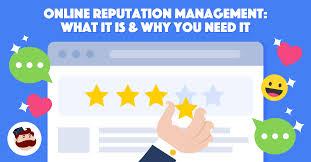Mastering Online Reputation Management: Strategies for Success in the Digital Age
The Importance of Online Reputation Management
In today’s digital age, online reputation management has become a critical aspect for individuals and businesses alike. With the proliferation of social media and online review platforms, a single negative comment or review can significantly impact one’s reputation.
Online reputation management involves monitoring, influencing, and controlling an individual’s or organisation’s reputation on the internet. It is about ensuring that search results reflect positively on the entity and that any negative content is effectively managed and mitigated.
Why Online Reputation Management Matters
A positive online reputation can enhance credibility, trust, and visibility. Consumers often rely on online reviews and feedback to make purchasing decisions. A strong online presence can attract customers and boost sales.
Conversely, a negative online reputation can lead to loss of business opportunities, damage to brand image, and decreased trust among stakeholders. It is crucial for individuals and businesses to actively monitor their online presence and address any negative content promptly.
Strategies for Effective Online Reputation Management
- Monitor Online Mentions: Regularly monitor social media platforms, review sites, and search engine results to stay informed about what is being said about you or your business.
- Engage with Your Audience: Respond to comments, reviews, and feedback in a timely and professional manner. Show that you value customer input and are willing to address concerns.
- Create Positive Content: Develop a strong online presence through engaging content such as blog posts, articles, videos, and social media updates. Highlight your expertise and achievements.
- Seek Professional Help: Consider enlisting the services of online reputation management experts who can help you develop a comprehensive strategy to improve your online image.
The Future of Online Reputation Management
As the digital landscape continues to evolve, online reputation management will remain a vital component of personal branding and corporate identity. It is essential for individuals and businesses to proactively manage their online reputation to stay competitive in today’s fast-paced world.
By investing time and resources into building a positive online presence and effectively managing any negative feedback or content, individuals and businesses can safeguard their reputation and maintain credibility in the eyes of their target audience.
Top 6 FAQs About Online Reputation Management: Essential Insights and Tips
- What is online reputation management?
- Why is online reputation management important?
- How can I monitor my online reputation?
- What are the consequences of a negative online reputation?
- How can I respond to negative reviews or comments effectively?
- Should I hire a professional for online reputation management?
What is online reputation management?
Online reputation management is the practice of monitoring, influencing, and controlling an individual’s or organisation’s reputation on the internet. It involves actively managing how one is perceived online to ensure that search results and online content reflect positively on them. Online reputation management encompasses strategies to address and mitigate negative feedback, comments, or reviews while promoting positive content to enhance credibility and trust among stakeholders. In today’s digital age, where online presence plays a significant role in shaping perceptions, effective online reputation management is crucial for individuals and businesses to maintain a favourable image and build trust with their audience.
Why is online reputation management important?
Online reputation management is crucial because it directly impacts how individuals and businesses are perceived in the digital realm. In today’s interconnected world, where information spreads rapidly online, a positive reputation can enhance credibility, trust, and visibility. Consumers often rely on online reviews and feedback to make informed decisions, making a strong online presence essential for attracting customers and driving business growth. Conversely, a negative online reputation can lead to lost opportunities, damage to brand image, and decreased trust among stakeholders. By actively managing their online reputation, individuals and businesses can shape public perception, mitigate potential risks, and maintain a positive image that resonates with their target audience.
How can I monitor my online reputation?
Monitoring your online reputation is crucial in today’s digital landscape. To effectively monitor your online reputation, start by setting up Google Alerts for your name or business name to receive notifications whenever new content is published about you. Regularly check social media platforms, review sites, and search engine results to stay informed about what is being said. Engage with your audience by responding to comments and feedback promptly and professionally. Consider using online reputation management tools that can help you track mentions and sentiment across various online channels. By actively monitoring your online presence, you can address any negative content swiftly and maintain a positive image online.
What are the consequences of a negative online reputation?
A negative online reputation can have far-reaching consequences for individuals and businesses. It can lead to a loss of trust and credibility among customers, resulting in decreased sales and business opportunities. Negative reviews or comments can tarnish a brand’s image, making it challenging to attract new customers or retain existing ones. Additionally, a poor online reputation can impact search engine rankings, making it harder for the entity to be discovered by potential clients. Managing and addressing negative feedback promptly is crucial to mitigate the damaging effects of a negative online reputation and rebuild trust with stakeholders.
How can I respond to negative reviews or comments effectively?
When faced with negative reviews or comments online, it is crucial to respond promptly and professionally to address the issue effectively. Start by acknowledging the feedback and expressing gratitude for the input, showing that you value customer opinions. Avoid being defensive or dismissive; instead, offer a sincere apology if necessary and demonstrate a willingness to resolve the issue. Provide a solution or offer to take the conversation offline to further discuss and rectify the situation. By responding thoughtfully and constructively to negative reviews or comments, you can not only show your commitment to customer satisfaction but also potentially turn a negative experience into a positive one.
Should I hire a professional for online reputation management?
When considering whether to hire a professional for online reputation management, it is important to weigh the potential benefits against the resources and expertise required to effectively manage one’s online image. Professionals in this field have the knowledge and tools to monitor, assess, and address online feedback and content efficiently. They can develop tailored strategies to enhance positive visibility and mitigate any negative impact on your reputation. By enlisting the services of a professional in online reputation management, individuals and businesses can benefit from expert guidance and support in navigating the complexities of the digital landscape, ultimately safeguarding their image and credibility in an increasingly competitive online environment.




